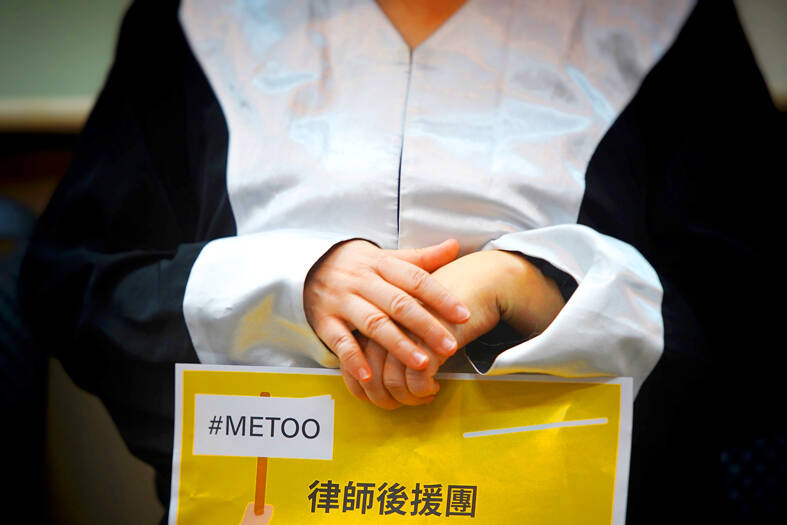The Taiwan Bar Association yesterday said it is teaming up with women’s groups to provide free legal counsel to #MeToo accusers, citing concerns that defamation laws are being used to silence victims of sexual abuse.
Accusers face tremendous pressure and social stigma that they are only seeking attention, National Alliance of Taiwanese Women’s Associations chairwoman Peng Yen-wen (彭渰雯) told a news conference at the Taiwan Women’s Center in Taipei.
Victims who go public with their accusations are often tried by the court of public opinion as well as the court of law, as abusers frequently use the considerable financial expenses associated with protracted litigation to intimidate their accusers, she said.

Photo: CNA
The project is a collaboration between women’s rights groups and lawyers to shield sexual abuse victims from frivolous or vindictive lawsuits, she said.
The project’s legal team consisting of more than 40 attorneys can be reached by calling (02) 8911-5595, and businesses can request a consultation on handling workplace sexual harassment by calling (02) 2388-3619, its spokesperson said.
The Garden of Eden Foundation saw a fivefold increase in sexual harassment complaints after it set up a hotline early last month, executive director Wang Yue-hao (王玥好) said.
Callers consistently expressed fears that they would not be believed and often asked for nothing more than a sympathetic ear, she said, adding that the legal advocacy project is intended as a remedy to systematic and institutional biases against victims.
Citing a survey conducted by the Ministry of Labor last year, Awakening Foundation secretary-general Chyn Yu-rung (覃玉蓉) said that 78.79 percent of working women reported being harassed at work without ever filing a complaint.
This figure suggests there is a lack of trust by women in their complaints being fairly investigated by the justice system and corporate workplace, she said.
The Awakening Foundation received numerous calls from corporations asking about possible steps they can take to protect employees from harassment following the rise of the #MeToo movement in Taiwan, she said.
The government should furnish the personnel and guidelines that businesses need to realize workplace gender equality, Wang said, adding that prevention and enforcement are equally important in curbing inappropriate behavior.
Neil Pan (潘天慶), a member of the legal team, said that #MeToo accusers are typically in an unequal power relationship with their alleged abusers, meaning that legal protections against reputational damage need to be recalibrated in cases revolving around abuse.
The courts should exercise caution in dealing with defamation cases around allegations of sexual abuse to avoid the weaponization of the law by abusers, he said, adding that awarding exorbitant damages would have a chilling effect on victims.

The Central Election Commission has amended election and recall regulations to require elected office candidates to provide proof that they have no Chinese citizenship, a Cabinet report said. The commission on Oct. 29 last year revised the Measures for the Permission of Family-based Residence, Long-term Residence and Settlement of People from the Mainland Area in the Taiwan Area (大陸地區人民在台灣地區依親居留長期居留或定居許可辦法), the Executive Yuan said in a report it submitted to the legislature for review. The revision requires Chinese citizens applying for permanent residency to submit notarial documents showing that they have lost their Chinese household record and have renounced — or have never

A magnitude 5.6 earthquake struck off the coast of Yilan County at 12:37pm today, with clear shaking felt across much of northern Taiwan. There were no immediate reports of damage. The epicenter of the quake was 16.9km east-southeast of Yilan County Hall offshore at a depth of 66.8km, Central Weather Administration (CWA) data showed. The maximum intensity registered at a 4 in Yilan County’s Nanao Township (南澳) on Taiwan’s seven-tier scale. Other parts of Yilan, as well as certain areas of Hualien County, Taipei, New Taipei City, Taoyuan, Hsinchu County, Taichung and Miaoli County, recorded intensities of 3. Residents of Yilan County and Taipei received

Taiwan has secured another breakthrough in fruit exports, with jujubes, dragon fruit and lychees approved for shipment to the EU, the Ministry of Agriculture said yesterday. The Animal and Plant Health Inspection Agency on Thursday received formal notification of the approval from the EU, the ministry said, adding that the decision was expected to expand Taiwanese fruit producers’ access to high-end European markets. Taiwan exported 126 tonnes of lychees last year, valued at US$1.48 million, with Japan accounting for 102 tonnes. Other export destinations included New Zealand, Hong Kong, the US and Australia, ministry data showed. Jujube exports totaled 103 tonnes, valued at

BIG SPENDERS: Foreign investors bought the most Taiwan equities since 2005, signaling confidence that an AI boom would continue to benefit chipmakers Taiwan Semiconductor Manufacturing Co’s (TSMC, 台積電) market capitalization swelled to US$2 trillion for the first time following a 4.25 percent rally in its American depositary receipts (ADR) overnight, putting the world’s biggest contract chipmaker sixth on the list of the world’s biggest companies by market capitalization, just behind Amazon.com Inc. The site CompaniesMarketcap.com ranked TSMC ahead of Saudi Aramco and Meta Platforms Inc. The Taiwanese company’s ADRs on Tuesday surged to US$385.75 on the New York Stock Exchange, as strong demand for artificial intelligence (AI) applications led to chip supply constraints and boost revenue growth to record-breaking levels. Each TSMC ADR represents